#and this IS mr - more than plot device- THIS IS MR EXPOSITION BOX
Explore tagged Tumblr posts
Text
and also. I know I'm always Loudly resenting the implication he is foolish and untrustworthy w this information For Real- mostly cuz its A Justification For Uncaring Violence, at least grapple, bitch- and yeah maybe it is in some ways true but also this is Mr. Plot Device to you, his writing is very governed by plot needs and it can be convingcingly held off.
Regardless I refuse to belief any fumbling it would really have to do with overtalking or being foolish as it would have to do with. Being on the moisture farm. Seeing Luke, grown into a man and yet a bright eyed boy in a way his father was so not at this age, when- when they were both ehre last, when SHMI died, threepio is as connected to shmi as he is to Ani- no, Luke has the innocence and light and Haircut his father had as a kid.... and he asks so earnestly Wait, what did you know of my father? can i be a jedi knight? ill be brave and true. I want to do good if I can. I want to save that princess lady. and thats his sister and youve watched her grow into such a woman as well and.... yeah no he'd spill it because hes emotionally overwhelmed and damn it maybe someone should start saying things! maybe its reasonable to say At Least Some Things!
ONCE AGAIN- over and over- thinking about all the ways that. despite how cruelly it was done and everything it took away from- so many people, to be honest, from so many people- how much Worse C-3PO would be if his memory wasn't wiped. If he had an idea of what he lost? what a better world looked like? who he is and what he was programmed for- and BY? girl.
#typed helf odd three times until i realized what was bothering me#also once again. howling at the moon. LET THESE KIDS KNOW THEIR MOM AND GRANDMAAA#but the reverse structure of the narrative always requires loss of knowledge!#and this IS mr - more than plot device- THIS IS MR EXPOSITION BOX#his state is the state of knowldege in the world#and the world is fascist so knowledge is awkward and apologetic and missing large chunks. but it is there and it Battle Of Endor matters
4 notes
·
View notes
Text
Ranking The Mission: Impossible Films (Including Dead Reckoning Part 1)
(adsbygoogle = window.adsbygoogle || []).push({});
By Hector Franco
Follow @MrHector_Franco !function(d,s,id){var js,fjs=d.getElementsByTagName(s)[0],p=/^http:/.test(d.location)?'http':'https';if(!d.getElementById(id))(document, 'script', 'twitter-wjs'); Follow @Frontproofmedia!function(d,s,id){var js,fjs=d.getElementsByTagName(s)[0],p=/^http:/.test(d.location)?'http':'https';if(!d. getElementById(id))(document, 'script', 'twitter-wjs');
Published: July 13, 2023
Ranking The Mission: Impossible Films
For more than 20 years, the Mission: Impossible franchise has been a gift to moviegoers that has become more popular and even maintained a high-quality level. Critically and financially, the film series has only increased its stature over the last decade and could be ranked as the greatest action franchise of all time.
What started as a television series created by Bruce Geller that began in 1966 and ran for seven seasons until its end in 1973 has now become, in the streaming era, a legitimate reason for audiences to head to their local movie theatre.
Headed by one of the last remaining movie stars, Tom Cruise, as IMF (Impossible Missions Force) agent Ethan Hunt, the Mission: Impossible films lend themselves to sequels since they rely on the missions just as much as the characters themselves. Unlike most movies, Hunt is an active protagonist that pushes the narrative forward rather than waiting on the sidelines for the plot.
The films are known for their usage of ticking clocks, double agents, hacking, espionage, mission expositions, agents going rogue and being disavowed, plot twists, numerous MacGuffins to chase after, various locations, and of course, face mask disguises. And the now classic theme by Argentine composer Lalo Schifrin who did the scores for films like Dirty Harry, Bullit, and Enter the Dragon, is prevalent throughout each film.
Due to the excellent execution in which these plot devices are used on a continual basis, the series has kept audiences engaged and coming back for me.
With the recent release of Mission: Impossible - Dead Reckoning, Part 1, the seventh installment in the series, which will be the first of two films, it could be one of the last times we see this series with Tom Cruise at the helm. However, box office returns may keep more movies rolling down the line for years.
Reminiscing back through all the Mission: Impossible entries, five of the seven films leave little between them in terms of quality. How they are viewed and in which order you would place them is based on personal preference.
Looking at them through a recent lens, the films in this ranking could change yearly, and the one you would call your favorite could be on an everlasting rotation.
We will look at all seven films in the series and rank them on the worst-to-best scale, but all the movies on this list warrant multiple viewings.
"Mr. Hunt, this isn't mission difficult; it's mission impossible. "Difficult" should be a walk in the park for you." -- Mission Commander Swanbeck (Anthony Hopkins)
Mission: Impossible 2
May 2000
Box Office: $546.4 million
Mission: Impossible 2 will usually find itself at the bottom of most rankings. And while it does so here as well, it has more to do with the quality of the other films on the list. Despite where it landed, MI 2 highlights one of the aspects that has made the series stand the test of time. Almost every entry has a different director, and thus its own voice and style. It wasn’t until the sixth film in the franchise did the same director return for Mission: Impossible.
Hong Kong action movie director John Woo, best known for movies like The Killer, A Better Tomorrow, Hard Target, Broken Arrow, and Face/Off, brought his style and uniqueness to the series. While some of the other films in the series have taken some elements of other entries and expanded on them, Woo’s MI 2 sets itself apart by doing almost the opposite.
MI 2 is the only film in the series where Ethan Hunt hasn’t gone rogue or been disavowed by the IMF. A story that has Hunt trading wits with fellow IMF agent Sean Ambrose, who disguises himself as the main character on two occasions, makes him one of the more dangerous antagonists in the series.
Woo’s signature slow motion, snap zooms, and usage of doves are found throughout MI 2. The film’s MacGuffin is a virus called Chimera, and Ambrose attempts to gain the virus and sell it to a pharmaceutical company that will profit off a cure.
Another element that gives MI 2 an individual touch is the score by Hans Zimmer and the divisive use of rock band Limp Bizkit’s cover of the Mission Impossible theme.
What holds MI 2 back in comparison to the other films in the series is its relative lack of heists and mission scenes. There are some, such as at a horse racing event where female lead Nyah (Thandie Newton) uses her professional thief skills. But, a stronger focus on stylized action and less on plot and mission heists holds the film back from being one of the best in the franchise.
"You hung me out of a plane. You can tell a lot about a persons character by how they treat people they don't have to treat well." -- PHILIP SEYMOUR HOFFMAN - Owen Davian
Mission: Impossible 3
May 2006
Box Office: $398.5 million
Up until this point, the stakes have never been higher for Ethan Hunt and his team. Making his directorial debut, J.J. Abrams added a personal touch to the series by delving into the private life of its main character. At the beginning of the movie, Hunt is now retired and has a fiance and then wife, Julia Meade (Michelle Monaghan).
Hunt is brought back into the IMF fold by assistant IMF director John Musgrave (Billy Crudup) to save Lindsey Farris (Keri Russell), an agent he helped train that has been held captive in Berlin. An explosive implanted in Farris’ head leads to her death before Hunt can save her. A chase for this film’s MacGuffin, a biological weapon codenamed the “Rabbit’s Foot,” begins between Hunt’s team and arms dealer Owen Davian.
For some, the third installment ranks high due to the performance of Philip Seymour Hoffman as Owen Davian. Arguably, he is the franchise’s most memorable and menacing villain. Many sequences throughout show his calm and deadly demeanor. The opening scene shows Davian (Hoffman) threatening Hunt with a gun to his wife, asking for the location of the Rabbit’s Foot.
Starting at this point gives the film a sense of dread that there will be significant consequences for Hunt in this mission. Davian is a villain that is able to stay one step ahead of Hunt at almost every turn. During one interrogation scene on an airplane, he forces the IMF agent to lose his composure to the point of nearly killing him.
Besides Hoffman’s performance, MI 3 also has a solid team dynamic with Zhen Lei (Maggie Q), Declan Gormey (Jonathan Rhys Meyers), and the returning Luther Stickel (Ving Rhames). Rhames is one of the few characters that has returned for more than one film, being featured in all seven entries thus far.
Perhaps its greatest contribution to the franchise is the introduction of IMF agent and computer technician Benji Dunn (Simon Pegg). Bringing levity and perfectly placed comedic timing to the fold, Pegg’s inclusion has seen him in every film since. And he is always one of the highlights.
In many ways, MI 3 laid the foundation for the success of future installments in the series. Abrams brought a new level of action to the franchise, and it would take a substantial amount of effort and execution to surpass it.
"Kittridge, you've never seen me very upset." -- Tom Cruise - Ethan Hunt
Mission: Impossible
May 1996
Box Office: 457.7 million
The one that started it all arguably deserves the most credit for the series' continued substantial success. After all, if it had been a financial and critical failure, there wouldn't have been any sequels to follow.
In the director's chair sat the legendary Brian De Palma. The director has a resume that includes classics in a vast array of genres, including films like Carrie, Dressed To Kill, Scarface, Casualties of War, The Untouchables, and Carlito's Way. De Palma's signature style is felt throughout with his Dutch camera tilts, split diopter shots, close-ups, and his knowledge of when to use and not to use sound.
In some respects, this is the simplest of all the movies from a story perspective, but it does have all of the plot devices that the series would become known for. Face mask reveals, betrayals, and ticking clocks are found in the first Mission: Impossible, with the CIA's NOC list being the film's MacGuffin. Due to keeping the majority of the stunts and action practical, the action still holds up. Even the usage of an explosive stick of gum doesn't come off as too over the top due to the way it's used.
Possibly the scene and what the series itself is best known for is its heist mission. Hunt and the team infiltrate CIA headquarters to steal the NOC list from a secure area deep in the building. De Palma's expertise makes it to where a drop of sweat can feel heart pounding.
The first Mission: Impossible is the gold standard for a generation of audiences. It delivers over-the-top action while keeping the film grounded with its espionage heists. At this point, the margin of difference between this film and the others is slim, as for many, this entry could still find itself right on top.
The Mission: Impossible Franchise is one of the most consistent in film history.
"Our lives are the sum of our choices. And we cannot escape the past." -- Eugene Kittridge - Henry Czerny
Mission: Impossible - Dead Reckoning, Part 1 (7)
July 2023
The latest entry in the series is arguably it's boldest and most extensive in both scope and action. Over the last decade, what has separated Mission: Impossible films from franchises like Fast and the Furious or movies in the superhero genre is that it balanced its usage of visual effects and practical stunts, never going too far. Dead Reckoning continues that trend producing another perfect summer blockbuster.
The latest installment unbelievably ups the level of action to another plateau with multiple locations and jaw-dropping set pieces that are awe-inspiring to behold. Starting with an exploding submarine and an airport chase that somehow holds together evading IMF agents, disarming a nuclear bomb, and introducing a new character in Grace (Hayley Atwell) while attempting to get a hold of the film's MacGuffin is all balanced and well executed. A car chase through Rome followed by a confrontation in Venice continues the nonstop bombardment of Dead Reckoning's action set pieces.
Dead Reckoning also brings forth some new elements by giving hints of a backstory for Ethan Hunt before his time in the IMF. The plot features an AI that has gone rogue, and in today's world, with technology like Chat GPT, it will be relatable to modern audiences. Surprisingly, the film brings back Eugene Kittridge (Henry Czerny) from the original Mission: Impossible, giving the most insight into the inner working of the IMF since MI 3.
Hayley Atwell's performance as Grace is the most memorable of the movie, as anytime she is on screen with Cruise, she takes over a scene with her energy. She is another welcomed new addition to the franchise.
Dead Reckoning also deserves credit for being the first of a two-part story without leaving on a cliffhanger or in a manner that felt incomplete. There is more to come, but there is a level of satisfaction to the ending of Dead Reckoning that will leave audiences anticipating its sequel while enjoying what they were given here.
Lorne Balfe, who also composed the score for Mission: Impossible - Fallout, must be acknowledged for producing another fantastic composition that is, along with Fallout, the best in the series.
Where Dead Reckoning falters is surprising. Typically, Mission: Impossible is known for providing exposition that doesn't feel forced, only adding to the plot at hand. Dead Reckoning tends to over-explain and doesn't slow down enough to give the characters more time together other than to explain the next part of the mission. The audience doesn't need to have its hand held this much as showing is always more effective than telling.
Ilsa Faust (Rebecca Ferguson) suffers the most from the abundance of exposition. Her character has been vital to the plot and characters over the previous two installments, and she deserved more time as a fan favorite.
There is a beautiful quiet scene between Hunt and Faust as they look over the balcony at Venice and embrace. More of these scenes should have taken place. Ultimately, when her character finally meets her end, it isn't treated with the gravitas it deserves.
Overall, Dead Reckoning, Part 1, continues to exceed the expectations of a franchise that has delivered only high-quality sequels. It's almost difficult to quantify just how much is stuffed into the film without it being crushed by its own weight.
"You should've stayed out of the game- You should've come with me." -- Ethan Hunt and Ilsa Faust
Mission: Impossible - Fallout (6)
July 2018
Box Office: $791.7 million
The following two entries are essentially tied for the same spot. There is little between them, and only personal preference will one film be put over the other.
The sixth installment in the Mission: Impossible franchise feels like the magnum opus for Tom Cruise. It's the film he always wanted to make and will go down as one of the greatest action films of all time.
There is a darker tone for Fallout that ranges from the film's score by Lorne Balfe to the theme of the value of one life versus all life. The score from Balfe can't be understated, as it's unquestionably the finest in the franchise.
Christopher McQuarrie is the first director to return for more than one installment of Mission: Impossible, and as the dual role of writer, he amps up the stakes in his sequel.
At the beginning of the film, Hunt has to choose between saving the life of his longtime friend, Luther (Ving Rhames), and completing his mission, gathering three plutonium cores. This decision to determine the value of one life is throughout the movie, with multiple instances where Hunt has to take immediate action.
One scene, in particular, where a patrol officer happens to be in the wrong place at the wrong time, witnesses Hunt and his team completing a mission. Hunt then chooses to either let the officer be killed or blow his cover.
Fallout is filled with a plethora of memorable stunts and action scenes, including halo plane jumps, motorcycle chases through Paris, and Tom Cruise legitimately flying a helicopter. The practical stuntwork at one point led to Cruise breaking his ankle, delaying filming for about seven weeks.
Fallout, at almost 150 minutes, wastes no time moving at a rapid pace but never feeling like it's rushing.
Becoming the first female lead to return is Ilsa Faust (Rebecca Ferguson), who is just as great as she was in Rogue Nation. Also returning is the villain Solomon Lane (Sean Harris), whose former Syndicate group has evolved into the Apostles headed by John Lark (Henry Cavill) and his infamous mustache.
Fallout succeeds at all levels pulling in the best aspects of all the previous entries. It has memorable car and motorcycle chases, heists, and face mask reveals that not only fool characters but also the audience.
Fallout's finale may be the most dramatic of any in the series, using a ticking clock and multiple fight scene's down to the wire. There are very few flaws in Fallout, and it firmly establishes what an American action film can be at its best.
"Sir, Hunt is the living manifestation of destiny - and he has made you his mission." -- Alan Hunley - Alex Baldwin
Mission: Impossible - Rogue Nation (5)
July 2015
Box Office: $682.7 million
The first entry of writer/director Christopher McQuarrie's Mission: Impossible films is still arguably his best. McQuarrie and Cruise worked together beforehand in 2008s Valkyrie, 2012s Jack Reacher, and 2014s Edge of Tomorrow.
The team dynamic is at one of the series' best, and this is the most comedic of all the films. Simon Pegg and Tom Cruise have a chemistry that provides levity to action scenes without undercutting any serious notions. They are placed at the right time.
But what Rogue Nation brings to the table that gives it an edge over other entries is the introduction of MI6 Agent Ilsa Faust (Rebecca Ferguson). Adding another agent on Ethan Hunt's level increases the level of intensity in the action set pieces. Ferguson's performance steals the show anytime she is on screen.
The plot involves an organization of former elite government agents that were thought of as dead called The Syndicate. The primary villain, Solomon Lane (Sean Harris), is a mix of MI 2's Sean Ambrose, an experienced agent that can anticipate Hunt's next move, and MI 3's Owen Davian, with a calm and frightening demeanor.
At this point, it's almost redundant to continually praise the stunts in Mission: Impossible. But Rogue Nation has quite a few that are still a marvel to watch. The highly publicized airplane stunt where Cruise is hanging from the side of an airplane is a wonder to behold at the beginning of the film, and incredibly it only elevates from there.
The hand-to-hand combat scenes, specifically with Faust, are arguably at the highest level the series has showcased thus far. The water diving sequence in a power plant retrieving a MacGuffin that identifies members of The Syndicate keeps the audience in the palm of their hands, believing that this could be the end of Ethan Hunt. A thrilling motorcycle sequence follows through Casablanca that emphasizes Faust's agent skillset.
One of the highlight set pieces takes place at an Opera in Vienna, where there are multiple shooters in the area, leaving a sense of uncertainty about where certain characters stand.
Lastly, Rogue Nation has one of the finest third-act face masks reveals vindicating Hunt as he finally proves to the Director of the CIA, Alan Hunley (Alec Baldwin), that the Syndicate is indeed real.
Rogue Nation began a partnership between Cruise and McQuarrie that has paid dividends. This one is likely to continue to find more fans as time passes.
"Mission accomplished!" -- Ethan Hunt - Tom Cruise
Mission: Impossible - Ghost Protocol (4)
December 2011
Box Office: $694.7 million
For as much credit as Brian De Palma receives and deserves for putting Mission: Impossible back in the entertainment zeitgeist, 2011s Ghost Protocol not only revived the franchise while re-establishing Tom Cruise as a movie star, it was the beginning of a new age for the series—almost a reboot in a sense without rebooting.
Brad Bird, who primarily directed animated films like The Iron Giant, The Incredibles, and Ratatouille, directed the series' fourth installment. But what is it about Ghost Protocol that has it settling at the top of my list?
The most significant factor is the team dynamic and chemistry. Somehow even with a mostly absent Luther (Ving Rhames), the foursome of Benji Dunn(Simon Pegg), Jane Carter (Paula Patton), William Brandt (Jeremy Renner), along with Hunt, is quite possibly the best in the series. They have a chemistry that allows their actions to be fully explained without an abundance of exposition and generate genuine laughs.
Dunn, who is now a field agent, is in an outstanding heist sequence along with Hunt, where they infiltrate the Russian Kremlin using a digital mirror that has the ability to look like a hallway. It's almost cartoonish, but it keeps a newer field agent out of danger and gives the audience time with both characters.
Possibly, what the film is most notorious for is the sequence at the Burj Khalifa building in Dubai. Undoubtedly, this entire portion of the film is done to perfection from beginning to end. The improvisation used when their technology stops working and the way the heist exchange is still pulled off.
Cruise's insane stunt of swinging off a building that is the tallest skyscraper in the world looks just as dangerous as you can imagine. Even the sandstorm chase, following the events at the Burj Khalifa, is shot in a way that allows the audience to follow along with Hunt as he chases down the stolen MacGuffin of nuclear codes.
Admittingly, the film does falter, with the main antagonist being somewhat forgettable. The film only gives him a little time other than videos of his speeches. He is a man who wants to blow up the world just to do so. Michael Nyqvist gives an acceptable performance whenever he is put on screen but is given little to work with.
What lands Ghost Protocol here are the bookends.
The film has arguably the best opening sequence in the franchise. Hunt's extraction out of a Moscow prison leads to a stellar usage of the Mission: Impossible theme.
Finally, the ending isn't abrupt. It pulls us closer, letting the audience know that there are repercussions for the life Ethan Hunt has chosen. There are things he had to sacrifice. And while more than almost any other installment aside from the first, you don't need to have seen previous installments to enjoy Ghost Protocol; it remembers them.
Hunt looks from across a small harbor at his former wife Julia, who now lives an everyday life away from him. A smile is exchanged between the two letting him know that she is okay before he disappears into the fog for his next mission.
It's difficult to tell if Ghost Protocol will remain in this position. Five of the seven films in this Mission: Impossible series are as good as action filmmaking can be. When the second part of Dead Reckoning enters theaters in 2024, we'll take another look.
(Featured Photo: Paramount Pictures)
0 notes
Text
April 2021 Roundup
Welp - a few days late on this, but I’ve had a busy week, including finding a blue-tongue lizard in my house. I have no idea how or why the poor thing got in or where it thought it was going, but it gave me quite the shock. After some trial and error I was able to herd it into a box and release it in the backyard, where I suspect it’s made a home in my compost bin.
Other than that, this month I was lucky enough to live see my first live musical in over a year - The Wedding Singer. I love the movie and have listened to songs from the Broadway cast album, but this is the first time a professional production has been staged here. It was enormously fun, with an exuberant cast and tongue firmly in cheek. It was so nice to be back in a theatre (with social distanced seating) after everything was cancelled last year.
Reading
David Copperfield (Charles Dickens) - I’ve never really read much Dickens outside of A Christmas Carol, but I enjoyed the Iannucci film so much last year I decided to go back to the source material. I was surprised at how much that adaptation retained from a novel so large, at least in terms of important plot points, but then there’s a great deal of characters sitting in rooms and talking about things only tangentially related to the plot. It was an enjoyable read and of course Dickens is a witty writer, even if I found some parts a bit tedious - anytime Mr Micawber or Mr Peggotty shows up my eyes tended to glaze over. But the novel is dense with so many intersecting characters and plots that I can certainly see why it’s been well read and much studied.
A Column of Fire (Ken Follett) - the last (chronologically) novel of the Kingsbridge series, this time set in the 16th Century amid the Catholic/Protestant conflicts in England and France, but also touching on Spain, Switzerland, the Netherlands - even the Caribbean. Follett’s favourite tropes are all here; lovers kept apart by circumstance, despicable villains with too much pov page time, rape as a plot device, the apathy/self serving nature of kings and queens. Ned Willard is a typical Follett male (self insert) hero, and as usual it’s the female characters who are far more interesting - Margery the devout but conflicted English Catholic, and Sylvie the enterprising and determined French Protestant. Both are the object of Ned’s affection, which I suppose is telling, and Follett desperately needs to learn how to write some other kind of romantic plot.
Of course it packs in the historical events for them to witness and/or participate in, from the end of Mary I’s reign all the way to the Gunpowder Plot - but it does feel that the latter is rushed in at the end and the novel probably could have ended at the Armada. While I did enjoy the broadened scope, a part of me missed the locality of Kingsbridge as a microcosm of England - this book was more concerned with the macro perspective where the other books (particularly Pillars) was effective in telling the story through Kingsbridge-as-a-character. On the other hand, I did enjoy the France side of the plot (mostly for Sylvie) that covered the machinations of the Guise family, the struggles of French Protestants, and events such as the St Bartholomew’s Day massacre (a rather harrowing section).
Watching
Shadow and Bone (season 1) - I went into this show completely cold (other than the trailer and general excitement on my dash), and really enjoyed it. Alina was a bit generic spunky heroine at first, but she grew on me by the end although I can’t say I really cared much about any of the romantic plots (and want to stay faaaaar away from the discourse). It was the Crows were the real draw for me, and while I was aware that their material came from later books, for me (not knowing any better) their integration into the Grisha plot was seamless.
While I was impressed by the worldbuilding I could have done with a bit more exposition - I still don’t know who the Shu and Suli are, where Fjerda is in relation to Ravka and what the basis of the conflict between them is. On the other hand, I can appreciate they resisted the urge to do too much “as you know”-ing and assume the rest of the world will be revealed as it becomes relevant. Still, I think if shows can learn one thing from Game of Thrones, it’s the value of finding some way of presenting a map to the audience to give some geographic perspective - a few times I did find myself needing to think about which side of the Fold the characters were on at any given time, and have no idea where Nina and Matthias were meant to be at the end. But then I’m the person who constantly flips to consult the map at the front of a book while reading - I need to see it.
I’ll add my disappointment to the RH fans at the chance of seeing Lucy Griffiths again, only for her role as Luda to be a brief flashback that saw her promptly stabbed to death (her entire demo reel could be made up of death scenes at this point). It’s a real shame, because she is perfect for a series like this (in a role like Genya perhaps), and it seems like such a waste.
Mighty Ducks: Game Changers (episodes 1-6) - The new strategy for family entertainment: taking a property that was popular with young Gen X-ers and/or Elder Millennials in their childhoods, and rebooting/reviving it as a show they can now watch with their own kids. The premise is simple enough - the Ducks are now a corporate juggernaut of the live long enough to see yourself become the villain variety, cue a new rag tag underdog hockey team, training at the run down ice rink owned by a disillusioned Gordon Bombay.
It’s mildly entertaining, the child actors are all very good and I’m always here for Emilio Estevez, although I can do without the inevitable romance with Lauren Graham (the team’s coach and mother of one of the kids). But the most recent episode, where a bunch of the og Ducks (sans Charlie) appear, coupled with liberal use of the Ducks Theme, hit me right in the childhood. They got me! They got me with the nostalgia! Because I am a sucker.
The Handmaid’s Tale (season 4, episodes 1-3) - I was very frustrated with this show last season, because it seemed more concerned with endless extreme close ups of Elizabeth Moss emoting rather than telling a coherent story. June is a character with the thickest plot armour I’ve ever seen, while almost every person she comes into contact with meets a bitter end. Rather than the slow domino effect to topple the regime depicted in the original novel and its sequel The Testaments, the show is moving at a breakneck pace, while somehow little actually happens except rinse repeat torture/endurance porn.
More interesting is the Canada side of the story with Moira and Emily (the excellent Samira Wiley and Alexis Bledel), and the difficulties for refugees adapting to life outside of Gilead, which wasn’t explored in either novel and could use more focus in the show. Ann Dowd is absolutely compelling as Aunt Lydia, and a far more interesting villain than the Waterfords (whose scenes have become interminable) yet funnily enough doesn’t get the devoted close-ups, long speeches, or writer interest they do. I’m still watching, if only to see if the show follows her story in The Testaments or not.
Writing
Not a very productive month on the writing front at all, I can’t even bring myself to look at the meagre word counts, so I’m going to let them roll over into May.
11 notes
·
View notes
Text
Episode 40 Review: In Which Matt Calls Out Jean Paul (Redux)
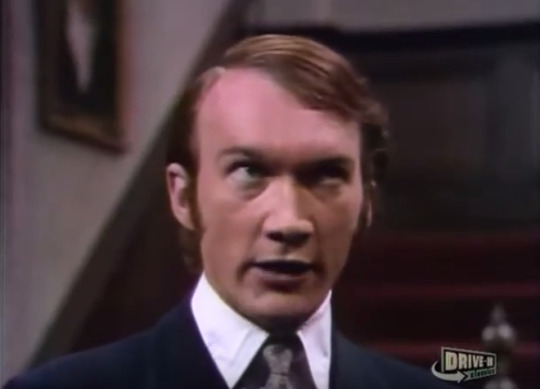
{ YouTube: 1 | 2 | 3 }
{ Full Synopses/Recaps: Debby Graham | Bryan Gruszka }
Welcome back to my Garden of Evil, the blog where I review and affectionately snark on Canada’s own all-American TV series, Strange Paradise. To my shock, Danny Horn of Dark Shadows Every Day (who introduced me to this delightfully crazy soap with his far more critical reviews) is back to posting more frequently than I do, which isn’t really relevant to this post save that I would not have expected it a year ago. (But then, there are many, many things that happened over this past year that I did not expect.) I would have posted this one sooner, but some urgent matters came up last week and I had to postpone.
Four episodes have passed since eccentric billionaire Jean Paul Desmond’s disastrous failed séance to contact his beloved late wife Erica. Medium and Conjure Woman Vangie Abbott has recovered from her injury, she and Raxl have tried (unsuccessfully) to decode the message in the sand writing box, and now Jean Paul insists on holding another séance! The other characters are trying to figure out how and why the ceremony was disrupted: most accuse Jean Paul of trying to murder them with the falling chandelier, while Vangie announces during the opening recap that she suspects the Reverend Matt Dawson of being a disruptive influence because of his disbelief in voodoo. Now sparks fly once again as another argument erupts between the Reverend and Jean Paul at an emergency meeting in the Great Hall.
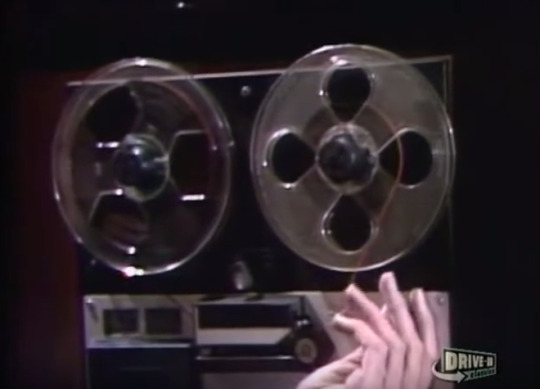
Now, let’s begin.
We open with Jean Paul’s first tape recorder journal entry in a while, which is an exposition device that I had been missing mostly because I like mooning over Colin Fox while listening to his gorgeous voice:
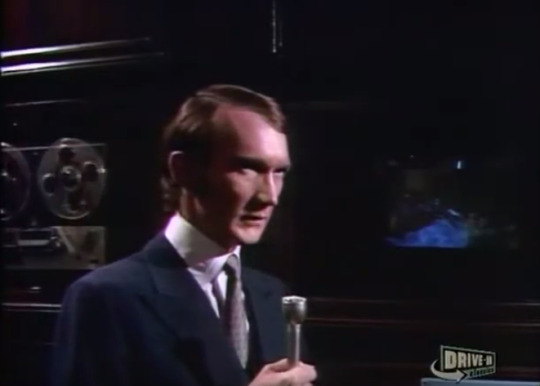
Jean Paul: "Erica, my sweet wife, until the day comes when science can restore you to me, can release you from the cryonic suspension colder than ice, as cold as my empty life, I will continue trying to contact you through a séance. You must know the great effort I am making to protect you! But was the evil of Jacques Eloi des Mondes enough to prevent us from making contact at the séance that failed? Erica, believe me! I fought him with all my strength! I held him at bay, but he could not have got through unaided! These people in this house, Erica, I have been thinking about them: are they in consort with the Devil? Which one prevented me from hearing your sweet voice again, my Erica? Which one? If I knew-"
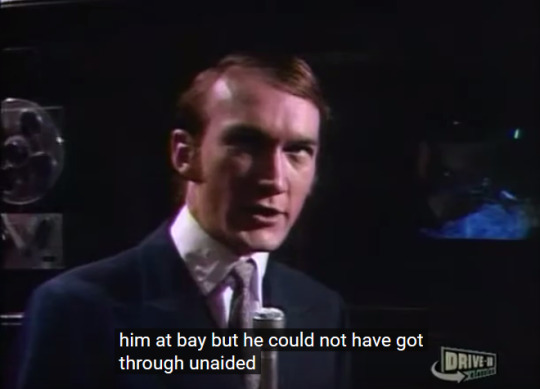
Caught him reading the Teleprompter! (That happens a lot in this episode, by the way.) Also, have I ever mentioned how much I love the lighting in his monitor room?
He stops recording when he sees Holly on the monitor, searching once again for that sweet secret passage in the crypt that she overheard the Reverend mention several episodes ago. Freaking out again over the possibility of danger to Erica’s cryonics capsule, he rushes down to the Great Hall and declares an emergency meeting:
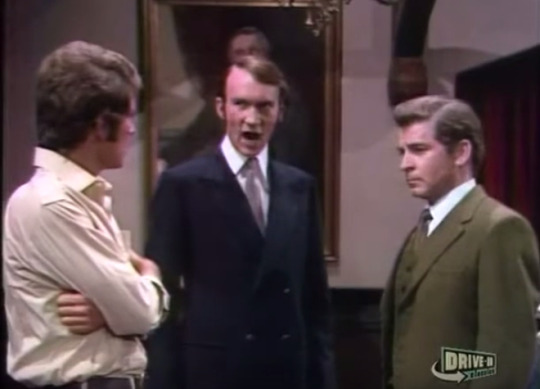
Jean Paul shouting at his detained guests.
"Reverend Dawson, Mr. Stanton, I'm beginning to realize that you have not fully grasped my ruling!" Jean Paul shouts in his most pompous tone. "Now, to each and every one of you, this is most important, and how important it is you will all find out!"
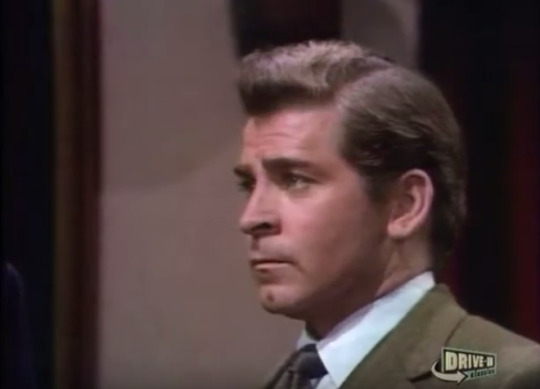
Matt having a scared. I don’t usually find Dan MacDonald cute, but I think he is in this shot.
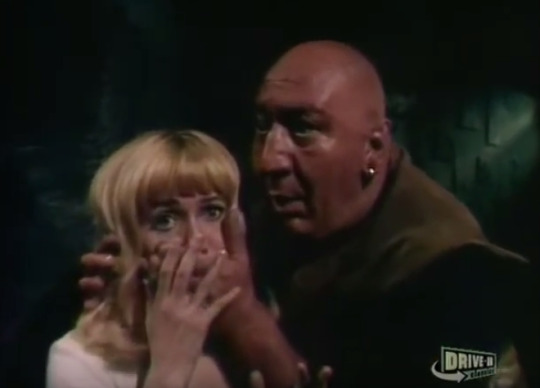
Quito guarding Holly as she hides in the crypt.
"EVERYBODY!” the Master of Maljardin shouts. “EVERYONE WITHIN THE SOUND OF MY VOICE!" [Line flub? His wording is odd.] "EVERYONE! COME TO THE GREAT HALL! DO YOU HEAR ME? EVERYONE IN THIS HOUSE! THIS IS JEAN PAUL DESMOND CALLING! COME TO THE GREAT HALL AT ONCE! YOU TOO, HOLLY MARSHALL! NOW, ONCE AND FOR ALL, YOU WILL ALL GET THE MESSAGE!"
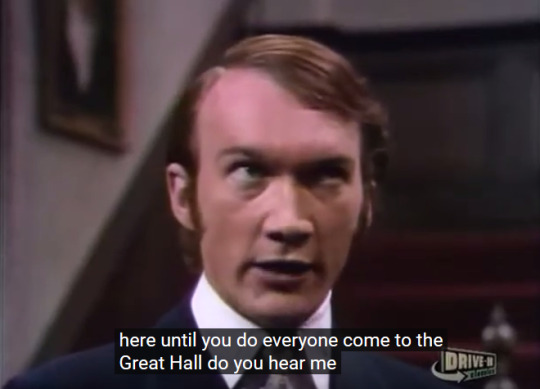
Jean Paul’s crazy eyes in this scene indicate that he means business.
Everyone gathers in the Great Hall, save Holly and Quito (who are hiding in the basement), Dan Forrest (who is probably in the tub), and Raxl (who isn’t there because Cosette Lee had the day off). Dr. Alison Carr is particularly annoyed, because she could be spending this time researching how to resurrect Erica, but instead is stuck listening to her brother-in-law’s latest hissy fit. Oddly enough, even though Jean Paul acts like a complete ass in this episode, Fox-C looks even more stunning than usual. I can’t explain why, but to me he looks especially handsome during Weeks 8 through 11 of the show. That certain je ne sais quoi of his just comes out particularly strongly during this period.
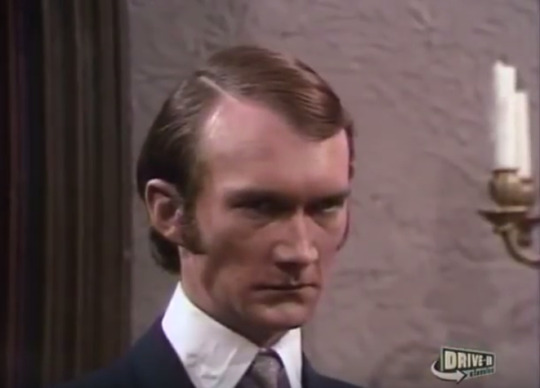
Jean Paul is so angry that you can see his jaw tensing.
Of all the detained guests in the room, he chooses to pick a fight with Matt, because that worked out so well for him five episodes ago. Elizabeth finds this highly amusing and comments with one of her best lines:
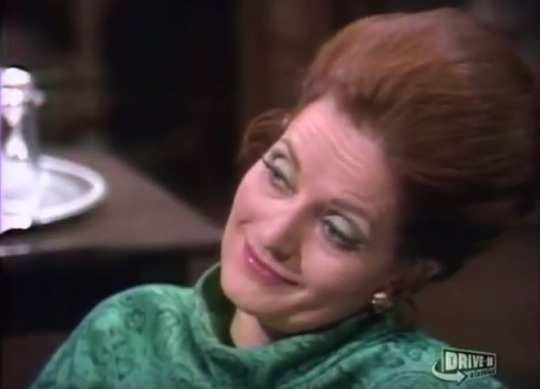
Elizabeth: "It seems to be your opportunity to entertain, Reverend. May I suggest Song of Solomon?"
Jean Paul doesn’t laugh, despite it being arguably the funniest joke anyone other than Jacques has made so far. I, too, want to hear Matt read from the Song of Solomon. Perhaps he has recorded a sermon about it for his album:
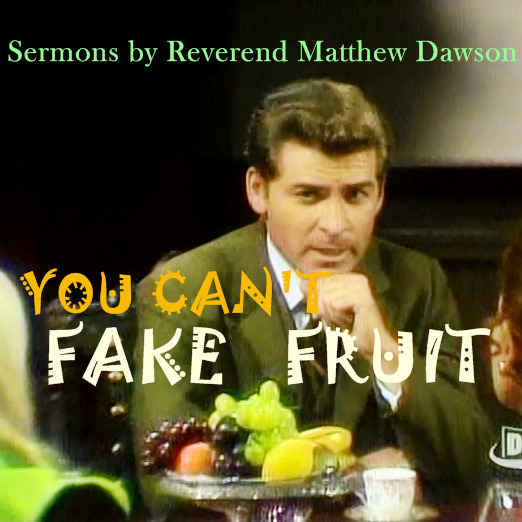
Matt’s album, You Can’t Fake Fruit, featuring his sermon “Wherever God Builds a House of Prayer, the Devil Builds a Chapel There” and selections from the Song of Solomon.
I’m not going to recap or quote their entire fight blow by blow, because I just don’t feel like it--and besides, these kinds of overly dramatic yelling matches are more fun to watch for yourself. However, I will note some highlights:
Matt suspects Jean Paul of murdering Dr. Menkin because of how soon he died after Erica. “Who can say how he died?” he asks as a rhetorical question before proclaiming overconfidently, “There, your control over this island begins to disintegrate!”
He also continues to oppose the notion that the Devil caused any of the events on the island, including the chandelier falling: “The chandelier falls, and it’s blamed on the Devil. And you accept these...superstitious reactions of a few, which are driving all of us beyond the bounds of reason!”
There’s a lot of focus on Holly, as you might expect, given that she‘s been searching in the crypt and also given Matt’s obsession with her. I’m glad he’s trying to protect her from Jean Paul now, even though I will always ship him with his right hand.
Alison stands up to Jean Paul and leaves in the middle of the argument. Good for her! Of course, after she leaves, Jean Paul has to passive-aggressively announce to everyone else that she will regret it.
Vangie tells Jean Paul and Matt that “when a devil works through a man, what he does is not an accident,” referring to the time that Dan allegedly damaged the cryocapsule. Jean Paul latches onto this idea, which Matt objects to because he believes it’s a ploy to turn everyone on the island against each other. So Jean Paul accuses Matt next of evil, which is not a question that most people will answer honestly. Ask Jacques if he’s evil and he will openly admit to it; ask someone like Elizabeth, on the other hand, and she will deny it.
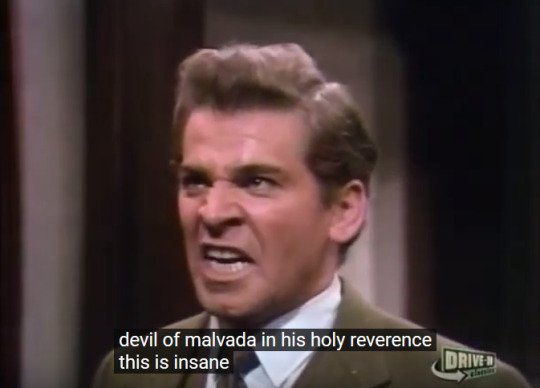
Matt being what the kids today would call “a mood.”
Vangie on Matt: “Because he is a man of the cloth--a religious man--he made the contact [with Erica], but because of his disbelief in the spirits, the chain was weakened, the contact breaks. I would say that whenever the Devil is loose, anything or anyone can be his tool.”
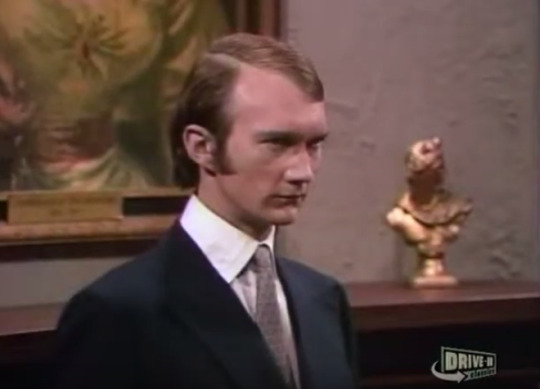
I would say that Jean Paul in this episode is a tool, albeit a very handsome one.
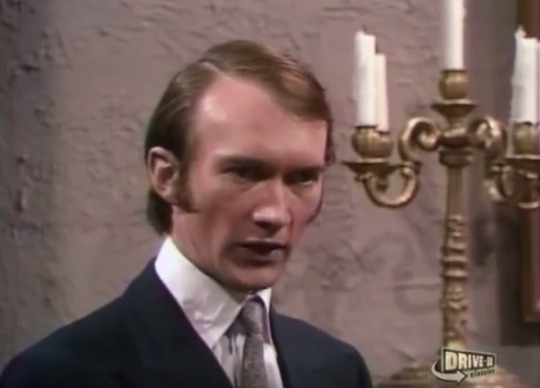
Even his anger can’t disguise his cuteness.
Jean Paul ends the argument by threatening to punish Holly for invading the crypt. “Now you will see what happens to those who intrude on Erica’s resting place,” he tells the others and Elizabeth responds with this interesting, cryptic line:
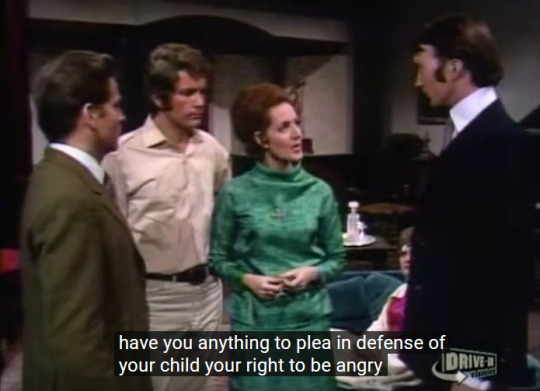
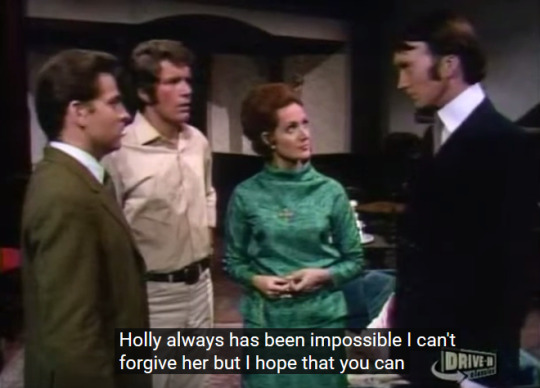
So she approves of Jean Paul’s anger at her “impossible” daughter, but she doesn’t want him to punish her? Also note that she is eerily calm when she delivers this line.
In the next scene, Jean Paul gives Holly some serious mixed messages along the lines of the time my grandfather (with whom I used to live) told me “don’t worry about it” when he noticed my cat scratching at my bedroom door, then threw a fit over the (barely) damaged carpet a few hours later. I moved out of his house two and a half years ago but, up until recently, I got nervous any time anyone told me not to worry about something, because he’d often say things like “don’t worry about it” and “take it easy” shortly before he lost his temper over the very same things he told me not to worry about. In a similar vein, Jean Paul first tells Holly to “go ahead” into the crypt, only to then start ranting about how he thinks that some people on the island want the cryocapsule to break down and want to tell the authorities about what he’s doing on Maljardin.
“Now, what were you looking for, Miss Marshall?” he asks her menacingly after his rant.
“I wouldn’t touch that!” she replies, referring to the capsule. “I want you to bring your wife back to life!”
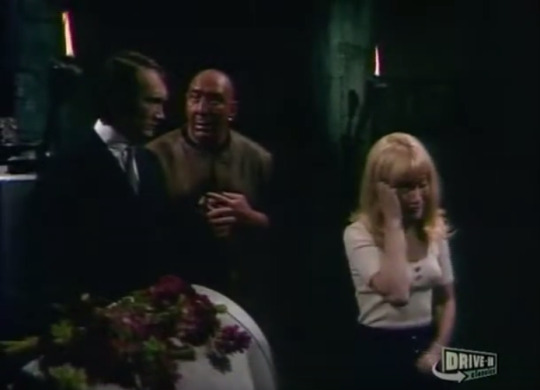
“Then what were you here for!”
“Looking for a way out!” She turns away from him, clutching her head. “Trying to get away from all this. I can’t stand it anymore!”
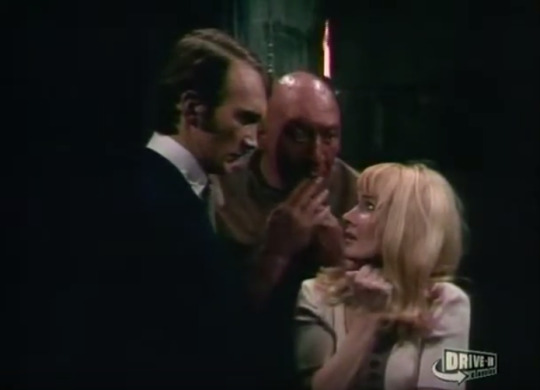
“I am going to have to make an example of you,” Jean Paul threatens.
“I was only looking for a secret door,” she protests, then explains how he (actually Jacques) led her down there to show him where she thought the secret passage was three episodes ago.
Before he can respond to her, Alison comes rushing down to the crypt to tell him about the notes of Dr. Menkin’s that Jacques left in her lab in Episode 38, which cover part of the previously missing six-week period of his experiments:
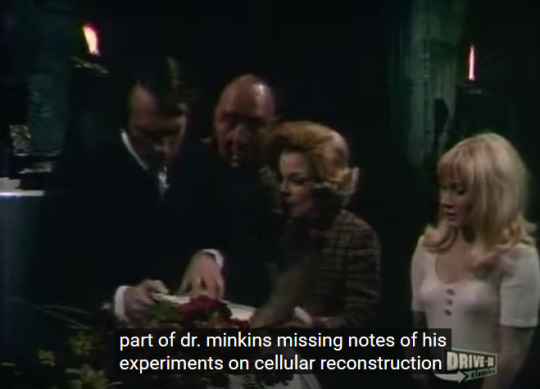
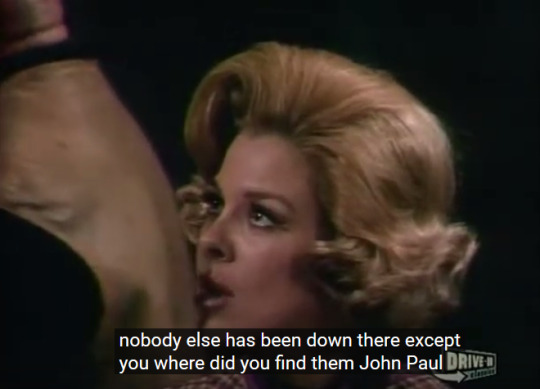
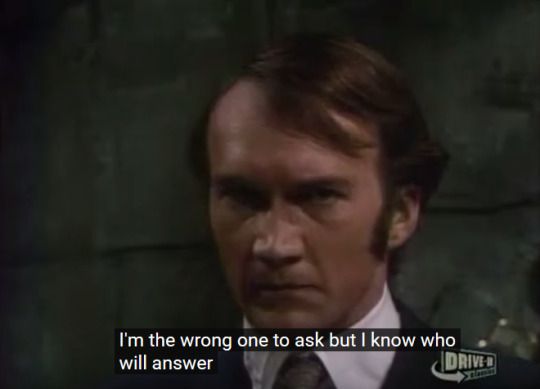
Sure, Jacques *might* answer, but only if he feels like it.
Jean Paul tells Alison, “guard these [notes] with your life,” and the episode ends, which means it’s time to discuss the Lost Episode summary. Normally, I do so in either the introduction or at a point in the episode where a plot point was changed, but here the events of the original episode differed so much from those of the final aired version that I decided to discuss them after my recap.
The Lost Episode 40
To begin, here is the summary for the original Episode 40:

Source: The Plain Dealer (November 7, 1969), p. 72.
So the second séance originally took place in this episode and involved a conflict between two spirits. But who? We know for certain the identity of one of these spirits, courtesy of these summaries for Episodes 41 and 42, respectively:
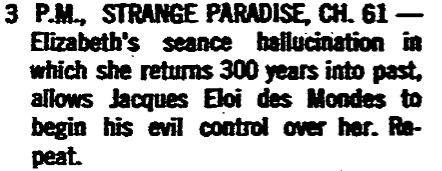
Source: Ibid, p. 84.
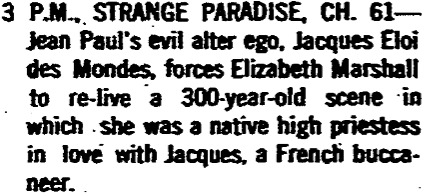
Source: Ibid., p. 88.
A slightly longer version of the latter summary from The Fitchburg Sentinel names this priestess Tarasca, the same figure who appeared in a puff of smoke in the original Episode 35 and whose existence apparently threatens Alison’s life. While most summaries of the original Episode 44 (including the one in The Plain Dealer) mention hallucinations, this one from The Minneapolis Star (November 13, 1969) specifically mentions that the hallucination took place at the séance:
Holly searches for the secret passageway when her sleeping mother re-lives the happenings at the séance.
So we know the identity of one of the fighting spirits from the second séance, but who is the other? This summary for Episode 38 states that Jacques promised Vangie that he wouldn’t interfere a second time, but can we really rely on him to keep his promises? (I believe that he most likely summoned Tarasca to mess with the second séance on his behalf while technically not getting involved in it himself.) Still, even considering Jacques’ lack of trustworthiness, it would make more sense for the other spirit to be Erica, given that the whole purpose of both séances is to contact her.
Curiously, another thing we know about the second séance is that Matt took part in it, because Vangie told him that Holly would be in danger if he refused. I know I called the summary for last episode boring, but hearing the way Vangie talks about him in this episode has made me rethink my previous dismissal of its importance. If Vangie demanded that Matt attend the second séance, that means that she must not have considered Matt a disruptive influence in the original, or at least not enough to exclude him.
Who else attended the séance? At the very least, Vangie, Matt, Jean Paul and Elizabeth, but logically Raxl and Quito as well because of their involvement in the Conjure Faith. Alison may also have attended, but I doubt it because (1) Vangie prefers séances with either five or seven participants including the spirit and (2) Alison is getting increasingly fed up with Jean Paul and may have refused to take part.
The mention of Holly being in danger also raises an additional question: which spirit was threatening her, Erica or Tarasca? For my attempt to answer that question--which would contain some spoilers if I included it here--you will have to wait for a future analysis.
Coming up next: The Bad Subtitle Special for Week 8, followed by a very special essay comparing Strange Paradise to the H. P. Lovecraft novella The Case of Charles Dexter Ward and its 1963 film adaptation The Haunted Palace. After that, a review of Episode 41.
{<- Previous: Episode 39 || Next: Episode 41 ->}
#strange paradise#ian martin#maljardin arc#week 8#episode 40#review#analysis#crazy eyes#cryonics capsule#genuinely scary episodes#jean paul's monitor room#lost episode summaries#passive aggressive jean paul#scenery chewing#sp and religion#speculation on ian martin's original story#storytime#tape recorder journal#tarasca#teleprompteritis#now with 50% more snark because of jean paul's behavior#i still love him but sometimes he is insufferable
1 note
·
View note
Photo

Betaal review: Shah Rukh Khan’s Netflix zombie show is dead on arrival - tv
https://liveindiatimes.com/betaal-review-shah-rukh-khans-netflix-zombie-show-is-dead-on-arrival-tv/

Betaal Creator – Patrick Graham Cast – Viineet Kumar, Aahana Kumra, Jitendra Joshi, Suchitra Pillai
It is customary for Indian film productions to conduct a ‘mahurat shot’ — a largely ceremonial practise — before beginning a shoot. The actors and crew are gathered, a ‘pandit’ is summoned, and a quick ‘pooja’ is performed to ensure a smooth production, excellent reviews and a big box office. Whether or not there was one here, Netflix should’ve prayed harder, because its latest Indian offering, Betaal, is yet another high-profile misfire from the streaming service in desperate need for a resurrection.
A similar ritual is conducted in the first episode of Betaal, when a contractor begins work on excavating a tunnel dating back to the British raj, to make room for a highway. But standing in his way is a bunch of superstitious villagers convinced that the tunnel is cursed. Messing with it, a creepy old lady says, would unleash an evil unlike anything they have seen before.
And so the smarmy contractor, played by Jitendra Joshi, under pressure for meeting deadlines and the impending visit of the chief minister, hires an elite military squad to clear the village, having paid the squad leader a bribe to convince her team that the villagers are, in fact, insurgents.
Watch the Betaal trailer here
https://www.youtube.com/watch?v=YSEVaVc-nOo
Like Avatar set in rural India, Betaal examines ideas of corruption, oppression and disenfranchisement, but it goes about it in such a shoddy manner that it does a disservice to both its underrepresented subjects and the horror genre in general. The zombies in Betaal not only run, they also use artillery, strategise, jibber-jabber, and, in one prime example of unintentional comedy, fly. George A Romero, God rest his soul, must be rolling in his grave.
Boasting the involvement of big banners such as horror-specialists Blumhouse and Shah Rukh Khan’s Red Chillies Entertainment, among others, Betaal routinely undermines its own timely themes with an over-reliance on needless gore, cheap jump scares, and plot contrivances.
It’s the sort of show where exposition about an ancient curse is delivered inside the shrine of the man responsible for having cast it. A child is inexplicably introduced into the action only to be used as a plot device later on. A character suddenly changes hair colour, and the best explanation a guy can come up with is this: “It must be because of the shock.”
But what the show does not realise is that by waving off something as freaky as a character’s spontaneous makeover, it is inadvertently raising the bar for itself. Since we have been told to not pay any attention to incidents such as this, we are justified in expecting something more sinister. But Betaal is perfectly satisfied doling out jump scares you can see coming a mile away and failing to make any sort of statement on its central theme, colonialism — both foreign and homegrown.

Viineet Kumar in a still from Netflix’s Betaal. ( Netflix )
Traditionally, zombies are considered perfect empty vessels onto which contemporary anxieties can be projected. While Shaun of the Dead made hilarious observations about the herd mentality of Britishers of a certain generation; Juan of the Dead was about illegal immigration. But what do the zombies in Betaal represent, other than our impossible-to-eradicate colonial hangover? “This is for the Jallianwala Bagh massacre!” a character yells while gunning down a horde of undead British soldiers.
Also read: Mrs Serial Killer movie review: Jacqueline Fernandez’s Netflix India film is more torturous than lockdown; one of the worst movies of 2020
At a time when an ongoing migrant crisis has put the spotlight on the ill-treatment of the underprivileged by elected officials and men and women in uniform, Betaal could have (and should have) been so much more. For a show that admittedly begins with an interesting idea, it can be staggeringly dumb. Characters are given little to do besides bark out instructions or obey them. True, it takes place over the course of one violent night, but none of the central characters evolve in any meaningful manner whatsoever.
As Sirohi, Viineet Kumar Singh overcompensates, as usual, for the thin writing. Like his previous collaboration with Red Chillies, the more horrific (but for wholly different reasons) Bard of Blood, he is under-utilised and his character is underwritten. There is an uneasiness to the manner in which he delivers military jargon, and this uneasiness is emblematic of the show as a whole. Creator Patrick Graham, who previously directed the rather enjoyable Ghoul for Netflix, is once again uncertain about whether to focus on the folk-horror elements, or the army action.
He settles into a tone that is too self-serious for its own good. Betaal is a goofy zombie show with poor makeup and cartoonish characters; a little humour would’ve killed nobody. But it’ll have to take something special for Netflix India to revive itself after this.
Follow @htshowbiz for more The author tweets @RohanNaahar
Source link
0 notes
Photo

New Post has been published on https://magzoso.com/tech/his-dark-materials-review-improved-second-attempt-but-not-enough/
His Dark Materials Review: Improved Second Attempt, but Not Enough

In the 2000s, as the Harry Potter film franchise was racking up billions of dollars at the box office worldwide, other studios tried to get in on the children’s fantasy act. Disney kick started an adaptation of C.S. Lewis’ seven-book series The Chronicles of Narnia, which ran for three entries before succumbing to falling critical and commercial reception. (Netflix will now attempt a do-over.) Nicole Kidman and Daniel Craig led the big-screen adaptation of Sir Philip Pullman’s trilogy His Dark Materials, which failed at the outset with The Golden Compass. It was deemed controversial for anti-religious themes, while funnily enough, others criticised it for diluting the elements that were critical of religion. A secondary problem was that Pullman’s complex world wasn’t suited for film.
Thankfully, TV is now ready. Benefitting off the combined might of BBC and HBO, the new series adaptation of His Dark Materials — from award-winning playwright and screenwriter Jack Thorne (Harry Potter and the Cursed Child) — has enough time and space to present the story and tackle its subtext, and enough budget to bring its fantastical world to life in a gorgeous and believable fashion. But it takes too long to really get going, running in circles for first three episodes. (Four were shown to critics.) And though the visuals are on point, the writing isn’t. Despite the elements at its disposal — talking animals, a modernised Victoriana fantasy, and scheming, tyrannical individuals — it’s made to feel ordinary, especially the farther it gets from its fantasy trappings.
On top of that, His Dark Materials feels like a children’s show at times. Pullman’s trilogy is often described as children’s books that adults should read, and the show’s producers had hoped it would be an adult TV show that children should watch. But His Dark Materials fails in that regard. Thorne said he did “a PhD in the books” because he wanted to “sound every note”, but he’s unable to realise those ambitions as the show is too talky in its approach. Everything is said out loud, with characters repeatedly shouting out their motivations, telling you how to feel about a scene, or pausing to dump exposition on another character before walking away. By being so simplistic, it doesn’t respect younger viewers and can’t pique the interest of adult fantasy fans.
His Dark Materials begins with on-screen text that notes it’s set in another world which is like and unlike ours. Here, a human soul manifests as an animal called a daemon. The all-powerful Magisterium, a church-like militaristic organisation opposed to new thinking, has controlled the world for centuries, except in the North. And it then introduces its chosen one, a rebellious girl called Lyra Belacqua (Dafne Keen), who as a baby, was dropped off by her uncle Lord Asriel (James McAvoy) at an Oxford college for her protection. (McAvoy has what amounts to a guest role.) Asriel has been roaming the North looking for info on something called the “Dust” that threatens the Magisterium, and he naturally turns down Lyra’s request to travel with him, for reasons largely unknown to her.
After Lyra’s best friend, a kitchen boy Roger Parslow (Lewin Lloyd), goes missing from Oxford, she is swayed by the mysterious Mrs. Coulter (Ruth Wilson), who whisks Lyra away to London with the promise of adventure and helping find her friend. But Roger isn’t the only missing child, with the Gyptian community — Pullman’s analogy of the Roma people — being the prime target. Their leader, Lord John Faa (Lucian Msamati), believes the Gobblers, a myth usually restricted to children’s stories, are behind the abductions and so, the Gyptians too set out for London. Meanwhile, the Magisterium’s Carlo Boreal (Ariyon Bakare) — changed from being an old man in his sixties to a Black British man — is trying to dig into an explorer’s past, who has a bigger presence in the second of Pullman’s books.
Wilson’s Mrs. Coulter is by far the most delightful of the early lot, as she switches between showing genuine care and affection for Lyra, and the curled-lip menace and steely-eyed determination that her job requires her to possess. The other human characters — McAvoy’s Asriel doesn’t get enough screen time — aren’t that engaging, though the aeronaut Lee Scoresby (Lin-Manuel Miranda), who shows up in episode four, injects the show with much-needed energy. In fact, it’s their daemons who are routinely more interesting, be it Mrs. Coulter’s silent golden monkey or Lyra’s ever-changing “Pan” Pantalaimon, who keeps switching between a mouse, a moth, and a snow-white ermine since Lyra isn’t an adult yet. But His Dark Materials hasn’t figured out what to do with daemons, except use them as exposition machines.

Ruth Wilson as Mrs. Coulter in His Dark Materials Photo Credit: BBC/HBO
This aforementioned expository problem is likely the only reliable part of the show, as multiple scenes in the same episode keep haring upon information that everyone — especially the audience — already has. In some cases, His Dark Materials could have easily made tweaks to ensure scenes unfolded in a different fashion than they do on-screen. And in other cases, it seems the show intentionally spins its wheels until it has arranged the other chess pieces on the board that allow the narrative to move forward. Elsewhere, His Dark Materials tries to pull on emotional cords that it has yet to string for itself, which causes scenes to fall flat as the viewers — save for long-time book fans — do not have the requisite level of attachment with the characters that the scenes need to function.
Meanwhile, His Dark Materials both falls into and plays against fantasy tropes. As the chosen one, Lyra is deemed special, important, and most valuable by nearly everyone on screen — her uncle Asriel is the only one who seems to disagree — and the show seems to take this to heart as well, instead of showing us how she’s special. Lyra figures out how to read the alethiometer, a truth-telling device, in a matter of days with no training at all, even though we are told that it takes books and years of learnings. It just feels wholly unconvincing. It’s okay for Lyra to be talented but it’s not okay for her to be a miraculous genius. On the other hand, the idea that the nomadic Gyptians would serve as better guardians for Lyra than the esteemed Oxford scholars is a sort of reversal of what we’ve come to expect from the genre.
But that’s not merely enough to lift an adaptation of Pullman’s work that’s much better at evoking the visual underpinnings than the thematic ones. In doing so, His Dark Materials leaves behind a somewhat generic offering, strange and surprising given the trilogy of books were noted for touching upon concepts that other fantasy authors usually didn’t. And in the process, it also wastes the good work of actors, who are working with an uneven and sluggish plot. Maybe the show will find its groove as the story kicks into gear — a second season has already been filmed, for what it’s worth — if only to equal the wonderfully-realised world that features witches and armoured bears. At least that’s the hope, or we might be looking at attempt number three in another decade or so.
His Dark Materials premieres November 5 on Hotstar, and November 24 on Star World in India.
0 notes
Text
5 Recent Movies (You Never Realized Were Completely Insane)
Nobody expects every movie to be great. For every Steven Spielberg, there’s a Tommy Wiseau. For every Ridley Scott, there’s, uh, well, another Ridley Scott. No self-respecting person has the time or inclination to watch everything Hollywood craps out, so it’s quite possible that you don’t know how bad some recent movies turned out to be. Luckily for you, we have no self-respect, so let us satiate your morbid curiosity by telling you all about this year’s most baffling cinematic turds (so far). SPOILERS AHEAD!
5
Folks, Tom Cruise Was The Real Mummy ALL ALONG
Tom Cruise played Jerry Maguire in Jerry Maguire, Jack Reacher in Jack Reacher, and someone who was born on the 4th of July in Born On The Fourth Of July. Guess who he plays in The Mummy. Go on, guess.
At first, Cruise’s character is your average U.S. Army sergeant in Iraq who seduces archaeologists to steal their maps and search for treasure. Early on, he gets into a fight with some alleged insurgents he happened to run into and orders a goddamn air strike on them — the military equivalent of asking your brother to finish the level for you.
Universal Pictures Instead of bombs, they dropped copies of the script.
Fortunately, we don’t have much time to mull over the ethical implications of all this, because the strike accidentally uncovers an ancient tomb:
Universal Pictures And like all ancient tombs in movies, it’s shaped like Clint Eastwood’s scowling face.
Cruise, the guy from New Girl, and the woman whose map he stole with his penis are sent in to investigate. They discover an ancient mummy, but more importantly, the archaeologist lets us know that Cruise sucks in bed (and not in the good sense). As they’re flying the Mummy back to England, after long stretches of dialogue about sexual inadequacy, the plane crashes and Tom Cruise fucking dies.
Unfortunately, the movie doesn’t end there — Cruise soon wakes up in a body bag, either because of the Mummy’s magic or some kind of weird loophole in Dianetics.
Universal Pictures If you told us Tom Cruise sleeps inside a plastic bag at home every day, we’d fully believe it.
A moment later, Cruise’s friend and two doctors walk in, and everyone’s biggest concern is that they can see the dick of this guy who just cheated death itself. Anyway, the Mummy ends up getting captured midway through the movie, a plot development that probably feels familiar to anyone who wasn’t in a coma between 2008 and now:
At one point we also meet Russell Crowe, who plays Dr. Jekyll. As in the Dr. Jekyll, the one who turns into the villainous Mr. Hyde. Presumably Hyde is the one who smacks hotel clerks with phones and insists on singing in public.
The third act then finds an army of corpses rising and attacking the city — though taking into consideration how Tom Cruise is in his 50s but has jet-black hair, works out like crazy, and spends most of this movie talking about how he boned someone more than 20 years younger than him, the sight of him fleeing a sea of rotting bodies ravaged by time accidentally becomes a powerful metaphor.
Then in the very end, Tom Cruise basically lets the Mummy win and use him as the host body for the god of death — but then he uses his new powers to kill her. So yes, Cruise now has ancient mummy powers, and will possibly develop an affinity for wearing toilet paper all over his body in the next movie he shows up in.
4
Did You Know Harriet Tubman Knew The Transformers?
It’s no secret that the Transformers series is basically the cinematic equivalent of watching a Monster Energy Drink in a paint shaker. Hell, the last movie found Mark Wahlberg guzzling a flaming bottle of Bud Light like that’s a normal thing to do. Even with the bar so low (and presumably on fire), Transformers: The Last Knight is maddeningly awful.
For starters, the story is an obvious attempt to smoosh together a bunch of popular TV shows into a Transformers movie. It opens with a dragon Transformer helping King Arthur, who’s seemingly engaged in some kind of game, for some kind of throne …
After a jarring time jump, we meet a scrappy gang of kids seemingly played by the Stranger Things kids’ stunt doubles:
What was that other big TV show from last year? Oh yeah, Westworld. Cue Anthony Hopkins delivering a bunch of nonsensical exposition about robots, which is apparently his jam now.
Here’s where the wheels really come off before they can retract and turn into a dinosaur. Hopkins explains that he is the only remaining member of a secret society that protects the secret history of the Transformers on Earth. It turns out that these giant-ass talking vehicles were present for many famous historical milestones. We just … forgot about them? Didn’t notice?
Members of the Society of Transformer Pals included Einstein, da Vinci, Shakespeare, and Stephen Hawking (who, by the way, is still alive, movie). Also a member? Harriet Tubman. That’s right, this movie is implying that Transformers helped the Underground Railroad. Which people have pointed out is a) insane, and b) you’d think giant weaponized robots could have done a touch more to help the slaves. At least the movie doesn’t raise the question of why the Transformers didn’t stop the Holocaust or some-
3
There Was A Movie About The Guy From Avatar Hanging Out With God In A Shack
Sam Worthington stars in The Shack, a movie adaptation of the best-selling Christian inspirational novel. The movie starts in the past, where we see our main character, Mack, and his mother being abused by his alcoholic dad. So naturally, Mack pours strychnine in his dad’s booze, probably murdering him, though it’s hard to say because this is never mentioned again.
Flash-forward to Mack all grown up and Sam-Worthington-like. But his life is still beset by tragedy, as his youngest daughter is kidnapped and murdered by a serial killer (!!!) during a camping trip. They never find her body, but Mack is told she was killed in a remote shack (a place the B52s would never in their right minds sing about). That winter, a distraught Mack receives a mysterious note inviting him to the shack, signed “Papa” — which is his wife’s nickname for God, not an implication that Ernest Hemingway is penning creepy notes from beyond the grave.
Thinking this might be his daughter’s killer, a gun-toting Mack accepts the invitation and heads up to the abandoned cabin, which sadly contains no chainsaws or Necronomicons. Instead, it magically (or I guess spiritually, since Christians don’t like magic) transforms into a cozy cottage straight out of a beer commercial. Even weirder, it’s now home to Octavia Spencer, who immediately says that she’s God. Also there are a flannel-clad Jesus and an Asian lady who’s apparently the Holy Spirit. Yeah, it’s the Holy Trinity, chilling out and enjoying their Carlsberg years.
Through a series of painfully long conversations, they convince Mack not to give up on his faith, embrace life, and maybe spruce up his living room with some Crate & Barrel chairs and assorted Martha Stewart bullshit. Jesus casually walks on water:
God listens to an iPod, for some reason:
And they show Mack a whole bunch of psychedelic ghosts out in a pasture, like Field Of Dreams mixed with Tron mixed with MDMA. Even more like Field Of Dreams, one of the ghosts is Mack’s dad. Who, if you’ll remember, was a real piece of shit. Mack hugs him, obviously.
In the end, God shows Mack where his daughter’s body was hidden, and they have a funeral for her. Which is nice and all, but maybe it would have been even nicer if, you know, his wife were there too? Or his kids? Hey, God, why is this one dude the only one who gets some damn closure?
2
iBoy: Netflix’s Weird-Ass Superhero Movie
While it sounds like a movie about Steve Jobs’ prepubescent years, iBoy is actually a Netflix production starring Arya Stark and … umm, some guy who knows Arya Stark. Its story of a teenage boy with an unrequited crush on his neighbor takes a sharp turn when he walks in on a gang of masked thugs sexually assaulting her (bullshit rape storylines seem to follow Game Of Thrones actors around). The kid flees, but as he’s calling the cops, he gets shot in the head.
Instead of, you know, immediately killing him, the pieces of exploded phone embed themselves in his brain …
… which give him superpowers. More specifically, he can psychically read and even control smartphones. And of course the human cellphone uses his powers to fight crime like a tween-friendly Dark Knight.
You may be wondering how he actually fights bad guys. After all, having Google Maps and Shazam coursing through your cerebral cortex doesn’t necessarily mean you can kick ass. It’s simple: When he’s cornered by a cadre of thugs, iBoy psychically causes all their phones to explode:
Say what you will about Batman, but even he hasn’t been able to figure out a way to set his adversaries’ balls on fire without lifting a finger.
1
Fuck You, The Book Of Henry
Judging by the box office results, a lot of you didn’t see Jurassic World director Colin Trevorrow’s The Book Of Henry, either because it was savaged by critics or because the poster made it look like the world’s crappiest Choose Your Own Adventure book.
The film tells the story of Henry, a genius kid straight out of a script Wes Anderson started and then threw away. He spends his life making Rube Goldberg devices, playing the stock market, and generally being lauded for how brilliant he is. We never find out who his father was, though presumably his mom had a one-night stand with an anthropomorphic Screenwriting For Dummies book.
Oddly, his mom is content letting him run her entire life, which seems … unhealthy. She consults with him before financial decisions and sees him more as a sort of surrogate husband than a son. Even Marty McFly would find this dynamic unsettling.
Oddly, the precious, quirky, autumn-leaf-filled indie drama soon becomes very thriller-like when Henry notices that the girl who lives next door is being sexually abused by her stepdad — meaning some genius waltzed into a Hollywood studio and pitched “Rear Window, but with kids getting molested,” and it worked. Henry’s on the case, but no one will take him seriously because the stepdad is the police commissioner (and also played by Hank from Breaking Bad). So with the school principal and child services being total dicks, Henry formulates a plan … to murder the stepdad.
And by the way, we’re just getting started.
Before Henry can go through with his plan, in another twist, it turns out that he has a brain tumor. The titular character dies halfway through the movie. Henry’s little brother then tells the mom about Henry’s dying wish that she read his journal, which contains the elaborate murder plan. Henry is so annoyingly smart that he even anticipated what people would say out loud after he’s dead:
The mom rejects the plan at first, but eventually gets sucked in. She ends up buying a giant hunting rifle and luring her target into the woods during a school talent show:
She comes very close to pulling the trigger, but doesn’t go through with it, because she remembers that Henry was “a child.” Yeah, her arc is realizing she doesn’t have to do everything a young kid told her to. At the same time, the school principal finally decides to do something about the sex abuse. Why does she come to this conclusion? Because the girl’s dance at the talent show is just so pathos-filled.
What made The Book Of Henry a next-level debacle wasn’t simply its critical lambasting, paltry box office receipts, or “bloodstained Mad Libs you found at an abandoned bus station on Halloween” of a plot. No, it’s the fact that its utter craptitude might’ve catalyzed Trevorrow’s dismissal as the director of Star Wars Episode IX. This is why you never, ever pursue your passion projects, kids.
You (yes, you) should follow JM on Twitter, or check out the podcast Rewatchability.
If you loved this article and want more like it, please support our site with a visit to our Contribution Page.
We’re willing to bet the next transformers will be a movie based on a tv show based on a toy based on a USB memory stick. That USB memory stick is this.
Also check out 5 Really Awesome Movies Hidden Inside Really Crappy Movies and 5 Terrible Movies With Awesome Hidden Meanings.
Subscribe to our YouTube channel, and check out Scenes So Good They Make a Terrible Movie Worth Watching, and watch other videos you won’t see on the site!
Follow our new Pictofacts Facebook page, and we’ll follow you everywhere.
Get intimate with our new podcast Cracked Gets Personal. Subscribe for funny, fascinating episodes like “Inside The Secret Epidemic Of Cops Shooting Dogs” and “Murdered Sex Dolls And Porn Suitcases: What Garbagemen See,” available wherever you get your podcasts.
from All Of Beer http://allofbeer.com/5-recent-movies-you-never-realized-were-completely-insane/
0 notes